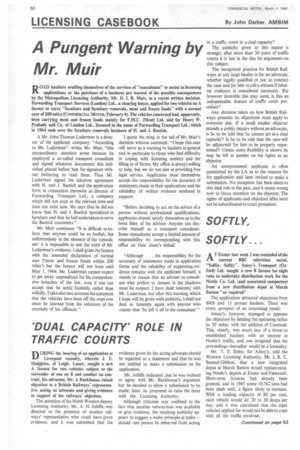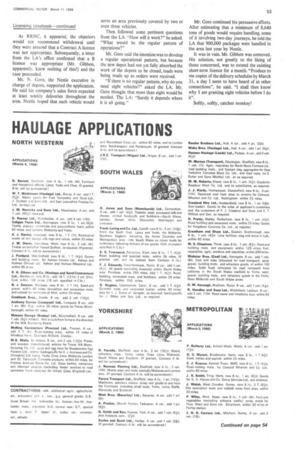SOFTLY, SOFTLY...
Page 52

Page 55

If you've noticed an error in this article please click here to report it so we can fix it.
AT Exeter last week I was reminded of the current BBC television serial, "Softly, Softly". Amey's Transport (Oxford) Ltd. sought a new B licence for eight vans to undertake distribution work for the Nestle Co. Ltd. (and associated companies) from a new distribution depot at Marsh Barton "as required".
The application attracted objections from BRS and 11 private hauliers. There was every prospect of an interesting tussle.
Amey's, however, managed to appease the objectors by limiting the operating radius to 50 miles, with the addition of Cornwall. This, clearly, was much less of a threat to established hauliers with an interest in Nestle's traffic, and one imagined that the proceedings thereafter would be a formality.
Mr. T. E. Eeley, for Amey's, told the Western Licensing Authority, Mr. J. R. C. Samuel-Gibbon, that a new integrated depot at Marsh Barton would replace existing Nestle's depots at Exeter and Falmouth. Short-term licences had already been granted, and in 1965 some 10,762 tons had been dealt with, a figure likely to increase. With a loading capacity of 80 per cent, each vehicle would do 20 to 30 drops per day, and it was calculated that the eight vehicles applied for would not be able to cope with all the traffic involved. At BANC. it appeared, the objectors would not recommend withdrawal until they were assured that a Contract A licence was not appropriate. Subsequently, a letter from the LA's office confirmed that a B licence was appropriate (Mr. Gibbon, apparently, knew nothing of this!) and the case proceeded.
Mr. N. Gore, the Nestle executive in charge of depots, supported the application. He said his company's sales force expected at least weekly deliveries throughout the area. Nestle hoped that each vehicle would serve an area previously covered by two or even three vehicles.
Then followed some pertinent questions from the LA. "How will it work?" he asked. "What would be the regular pattern of operations?"
Mr. Gore said the intention was to develop a regular operational pattern, but because the new depot had not yet fully absorbed the work of the depots to be closed, loads were being made up as orders were received.
"If there is no regular pattern, why do you need eight vehicles?" asked the LA. Mr. Gore thought that more than eight would be needed. The LA: "Surely it depends where it is all going." Mr. Gore continued his persuasive efforts. After estimating that a minimum of 8,640 tons of goods would require handling, some of it involving two-day journeys, he told the LA that 900,000 packages were handled in the area last year by Nestle.
It was in vain. Mr. Gibbon was unmoved. His solution, not greatly to the liking of those concerned, was to extend the existing short-term licence for a month. "Produce to me copies of the delivery schedules by March 31, a day I seem to have heard of in other connections", he said. "I shall then know why I am granting eight vehicles before I do it".
Softly, softly, catchee monkey!








































































































































